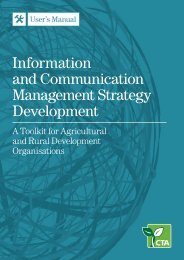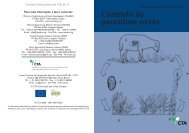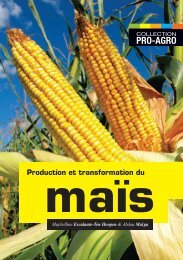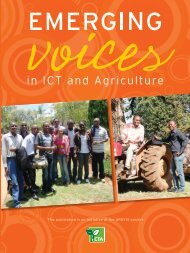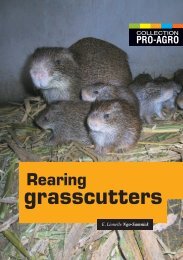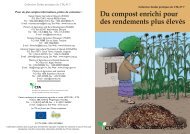Policy framework for Pastoralism in Africa
Policy framework for Pastoralism in Africa
Policy framework for Pastoralism in Africa
- No tags were found...
Create successful ePaper yourself
Turn your PDF publications into a flip-book with our unique Google optimized e-Paper software.
system, and <strong>in</strong> turn, reflect under-representation of pastoralists <strong>in</strong> policy and legislative re<strong>for</strong>mprocesses. There<strong>for</strong>e, Objective 1 of the <strong>framework</strong> covers issues of pastoral political representation,the legitimacy of traditional pastoral <strong>in</strong>stitutions, government commitment to propastoralpolicies <strong>in</strong> general, <strong>in</strong>tegration of these policies <strong>in</strong>to national <strong>framework</strong>s, the rolesand rights of women, and related issues.--Second, a more specific area deal<strong>in</strong>g with the core economic activity <strong>in</strong> pastoral areas livestockproduction – and approaches to protect and develop livestock assets, and further <strong>in</strong>tegrate thetrade of livestock and livestock products <strong>in</strong>to domestic, regional and <strong>in</strong>ternational markets.This livestock-focused objective <strong>in</strong> the <strong>framework</strong> emphasizes the importance of mobility tomake efficient use of rangeland resources, and the ecological and economic logic of enabl<strong>in</strong>g<strong>in</strong>-country and regional mobility. The objective also covers the need <strong>for</strong> risk-based approachesto drought management <strong>in</strong> pastoral areas, and related strategies <strong>for</strong> protect<strong>in</strong>g core livestockassets dur<strong>in</strong>g drought as a means to encourage rapid post-drought recovery.Objective 1Secure and protect the lives, livelihoods and rights of pastoral peoples and ensure cont<strong>in</strong>ent-wide commitmentto political, social and economic development of pastoral communities and pastoral areas.This objective focuses on policy and <strong>in</strong>stitutional strengthen<strong>in</strong>g processes, and support to goodgovernance which aims to:--Further recognize the role of pastoralism <strong>in</strong> development.--Demonstrate further commitment to pastoral development policy and related budgetarysupport.--Fully <strong>in</strong>tegrate pastoral issues <strong>in</strong>to national and regional decision-mak<strong>in</strong>g processes.--Acknowledge the legitimacy of traditional pastoral <strong>in</strong>stitutions.--Strengthen the roles and rights of women <strong>in</strong> pastoral communities.--Ma<strong>in</strong>stream pastoral issues <strong>in</strong> poverty reduction programmes.--Ensure policy support to models of basic service delivery which are designed specifically to suitthe context of pastoral areas.Strategy 1.1 Recognize the role of pastoralism <strong>in</strong> developmentAs described <strong>in</strong> section 2.3, pastoralism makes considerable economic contributions to <strong>Africa</strong>ncountries, but these contributions are not always fully understood or acknowledged <strong>in</strong> nationaldevelopment policy of pastoral areas policies. Pastoralists make use of scarce vegetation and waterresources available <strong>in</strong> hostile and marg<strong>in</strong>al arid and semi-arid lands, to produce meat, milk andother animal products. <strong>Pastoralism</strong> helps to protect and safeguard certa<strong>in</strong> national resources exist<strong>in</strong>g<strong>in</strong> these ecosystems. Yet, pastoralists live under enormous stress and constitute the most vulnerablesegment of <strong>Africa</strong>’s population. Policies directed at pastoral development often emphasizetechnical issues but overlook crucial social, economic, environmental and political measures whichcould empower pastoral communities to manage their resources better <strong>for</strong> their own benefit andthat of the countries concerned.While some progress towards supportive policies <strong>for</strong> pastoralism is evident at national and regionallevels, there is still a considerable need <strong>for</strong> improv<strong>in</strong>g understand<strong>in</strong>g of <strong>Africa</strong>n pastoralism <strong>in</strong> termsof its economic and ecological rationale, and the rights of pastoralists to access their rangelandsand pursue a livelihood of their choice.32 <strong>Policy</strong> <strong>framework</strong> <strong>for</strong> <strong>Pastoralism</strong> <strong>in</strong> <strong>Africa</strong>




